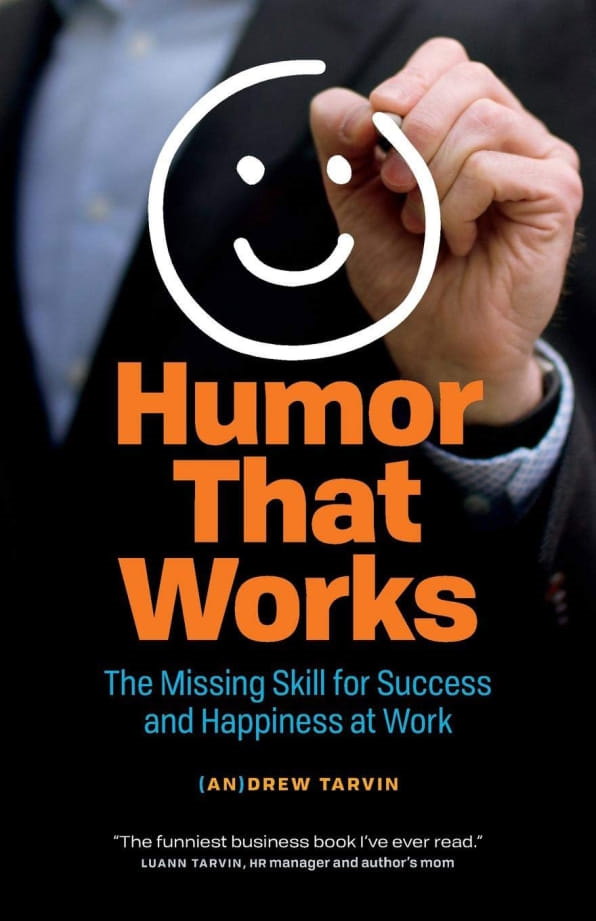These are the dangers of using humor in the workplace
By Andrew Tarvin
You probably know that there are many benefits of humor in the workplace. It encourages creativity , and it can help improve relationships, which leads to a better work culture. But it would be wrong not to mention the dangers of humor. Bob Mankoff, a former cartoon editor at the New Yorker, says humor can “unite and divide, teach and taunt, attract and repel.”
Humor is like a screwdriver–an incredibly useful tool that often involves a twist. When used in the right context, it can help you construct and deconstruct any number of objects. But to get the benefits, you have to use it correctly. If you try to use a Phillips head screwdriver on one of those screws that looks like a star, it won’t fit.
Humor is a fantastic tool when you use it appropriately. When you don’t, it can have serious consequences. Here are some dangers that you should be aware of.
Danger No. 1: It can distract people
Distraction can sometimes be a good thing. If you’re stressed out at work and near the point of burnout, taking a break to recharge can be valuable. But distraction can also create disaster.
As Jim Lyttle, PhD, shared in his paper on the judicious use of humor in the workplace, “While [humor] may seem harmless enough on a personal level, tomfoolery can lead workers to ignore quality or safety standards.” If you’re working in a factory and are too focused on your music, you could accidentally run into a wall or get hit by a forklift. Or if you’re working on a presentation, you might go down a rabbit hole of finding the perfect dog picture to include rather than focusing on building the rest of the content. Because humor is fun, it can keep people from focusing on the right things.
One of the first humor workshops I delivered at P&G was on using humor for innovation. The feedback after the event was that it was too fun. Too fun? That’s a thing? But to one person it was. “I had a lot of fun, but I don’t see how it’s going to help me do my job better.” I had failed to make a clear connection between the exercises and their impact–how making up words and defining them uses the same creative muscles as coming up with innovative solutions.
Some people also use humor as an alternative to getting anything done. Humor doesn’t replace work. If your boss says, “Hey, do you have those TPS reports?” You can’t just respond with a joke and move on. You actually have to do the TPS reports.
Humor can also be a strategy for inaction. That’s why court jesters existed in a monarchy. They were granted permission to poke fun at the court and point out its absurdities. The onlookers would laugh, the tension would be released, and the threat of revolt diminished. This still holds today, when you see companies (and individuals) joke about inequality without taking any actions to rectify it.
Danger No. 2: It can divide people
Humor has this incredible ability to bring people closer. When we laugh or smile together, we create a human-to-human connection. But it can also divide us.
“Although humor unifies, it also can divide by creating in- and out-groups and accentuating power differences,” says John C. Meyer, associate professor at the University of Southern Mississippi. If you’re not in on the joke, humor doesn’t create a connection. It destroys it. The shared laughter of the in-group says, “We’re cool with each other but not with you.”
It’s also why the dreaded “mandatory fun” can do more harm than good. Trust falls have become synonymous with team-building awfulness because they attempt to manufacture connection. For the people who prefer to focus on the work piling up on their desk, the experience that is supposed to bring people closer will only drive them further away.
Danger No. 3: It can disparage people
At its best, humor is a positive force for good. At its worst, it’s a tool used to suppress ideas, destroy self-esteem, and make people feel terrible.
“Disparagement humor can foster discrimination against targeted groups,” explains Thomas Ford, PhD, a researcher of prejudice, discrimination, and humor at Western Carolina University. “For prejudiced people, the belief that ‘a disparaging joke is just a joke’ trivializes the mistreatment of historically oppressed social groups.”

If you work in an environment that encourages ridicule and making fun of people, you’ll change your behavior. You’re less likely to share new ideas or be yourself out of fear of repercussions. If you’re often the butt of a joke, it can damage your self-esteem. This is true even if you’re the one making the joke, which is why you should use self-deprecating humor with caution. When leaders use aggressive humor, the detrimental effect compounds. One study found that when leaders used disparaging humor, their employees were more likely to engage in bad behavior, and were more likely to be disengaged with their work.
At the end of the day, humor is a tool. And just like any tool, it can be used to create or destroy. You need to be aware of its potential dangers to mitigate them.
I’ve dropped my phone on my toe at least 17 times in my life, but that doesn’t mean I’m going to give it up and start sending messenger pigeons (how would I send a GIF?). Humor carries some risk, but I still believe that the pros far outweigh the cons. Just be strategic about how you use it.
This article is adapted from Humor That Works: The Missing Skill for Success and Happiness at Work by Andrew Tarvin. It is reprinted with permission from Page Two.
(24)



